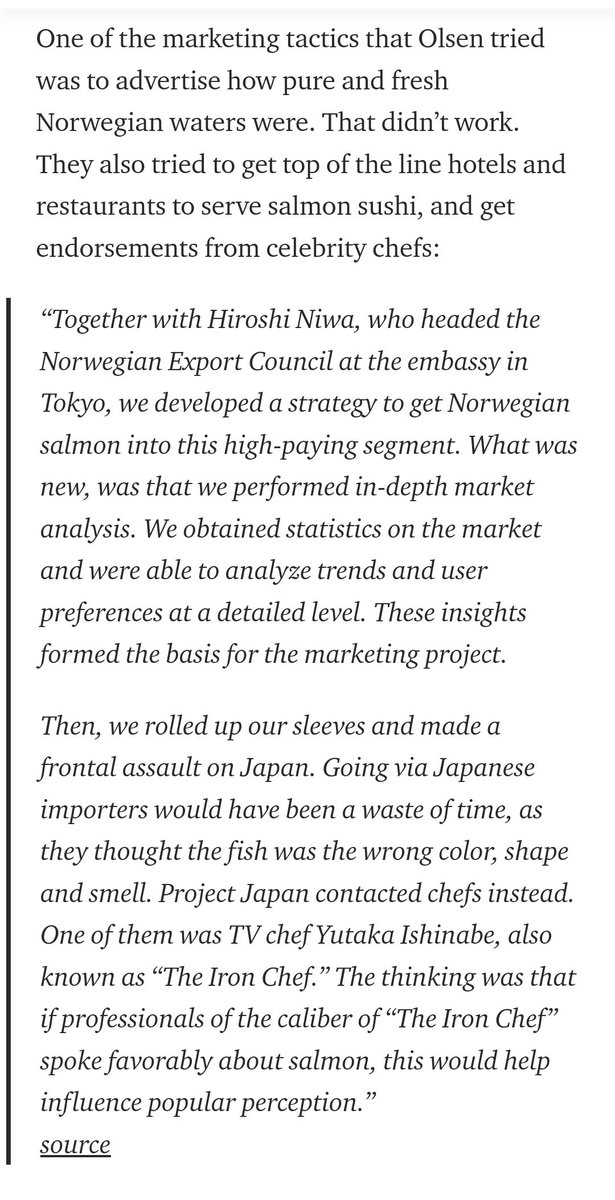
I tried out a new story I'm planning to use for a case study in class on a friend recently and it landed nicely. I said to him:
In diverse blue places like NY/NJ/CA/DC/Boston we see a lot of Indian, Chinese, Korean, Japanese, Mexican, Middle Eastern restaurants, right?
In diverse blue places like NY/NJ/CA/DC/Boston we see a lot of Indian, Chinese, Korean, Japanese, Mexican, Middle Eastern restaurants, right?
He says right.
And in day to day life in these places, how often do you come across an Indian, Chinese, Korean, Japanese, Mexican, Middle Eastern person?
He said very regularly. Almost daily.
Right. There's also a lot of Italian restaurant. Lots of Italian origin people.
Yup.
And in day to day life in these places, how often do you come across an Indian, Chinese, Korean, Japanese, Mexican, Middle Eastern person?
He said very regularly. Almost daily.
Right. There's also a lot of Italian restaurant. Lots of Italian origin people.
Yup.
What is one cuisine that is as common as any of these cuisines all over USA, but you barely meet any immigrants from that country?
He was like hmmm, Vietnamese? Caribbean?
I said nah, lots of immigrants/refugees from both places.
This cuisine has no real immigrant history!
He was like hmmm, Vietnamese? Caribbean?
I said nah, lots of immigrants/refugees from both places.
This cuisine has no real immigrant history!
The answer is Thai food. How many Thai people do you meet over the course of your life in the US? Very very few. How many Thai restaurants will pop up if you're in the US and check Yelp? At least a couple of them, right?
The answer is not very puzzling. It's a Thai govt thing.
The answer is not very puzzling. It's a Thai govt thing.
Multiple agencies across the Thai govt spend a lot of resources and planning and labor on this "gastrodiplomacy" policy.
The reason the Thai diaspora is negligible compared to those other nations but Thai food is everyone is not well known but simple.
vice.com/en/article/pax…
The reason the Thai diaspora is negligible compared to those other nations but Thai food is everyone is not well known but simple.
vice.com/en/article/pax…
There are just 300K Thai people in all of America. There are more than twice as many Indians in just the NYC area. But there are more Thai restaurants in the US than there are Indian restaurants. Because of a very unusual and innovative government program.
Context of this story will be a case study about the marketing and logistics strategies of the Thai government in this undertaking. It's most fascinating!
I don't mean case study as in a single pdf from Harvard with neat tables and all. I've kinda aged out of those. I'm phasing them out and replacing them with "case studies" of my own design. I don't write it all up. I choose a relevant context. Then...
https://twitter.com/chrismiss03/status/1460609527951228932?t=A5JcgRZ4LO8SzW9r0FrFQQ&s=19
Then I find a bunch of free publicly available stuff like papers avlbl thru Univ library, longform articles (like the Vice one above), serious blog posts, relevant videos and/or podcasts, choose about 4-5 of them. And that's their preparation for the class. To read/watch/hear.
I "lead" a couple of case study discussions myself first, as an example. Then student groups take turns leading case studies. They are encouraged to Google more stuff and read it if they like and use it in their analysis and class participation. And then we dive in.
There are no neatly collected tables and helpful business questions and a protagonist manager with easily identifiable problems. Like I said, I've aged out of those kinds of case studies. This approach is more fun. And everything is free and publicly available!
Oooh, should add a related story. Salmon in sushi seems as natural and normal as tuna in sushi but it is an extremely recent "innovation"! Japan didn't really eat salmon till the 90s.
But again, a government plan! This time, the Norwegians! Whaaaat?
But again, a government plan! This time, the Norwegians! Whaaaat?
https://twitter.com/patrix/status/1460609783174737932?t=A5JcgRZ4LO8SzW9r0FrFQQ&s=19
In the 70s, Norwegians had lots of great quality salmon but not enough Norwegians to sell it too. They looked at Japan which had recently started importing fish and where customers had deep pockets. They were like yo, Japan, how about y'all put our salmon in sushi? It's so good!
Japan recoiled with horror at first. It's not like they went oooh, what an idea! Send it over. Initial attempts were met with failure. Concerns from tradition and authenticity ("salmon on sushi? blasphemy!") to health concerns about whether salmon could even be consumed raw!
So there was a looooong campaign funded by the Norwegian government to market salmon, especially for sushi, to the Japanese. Cos sushi was starting to have a big market in the US too. They went all out. Some interesting bits.
Full story - medium.com/torodex/salmon…



Full story - medium.com/torodex/salmon…




Alright, Thai Food and Salmon sushi. Those two case studies should take up a week easily. 😁😁
See, this is why I love Twitter. It helps so much with my teaching. A random comment from @patrix and I have one hour of class planned!
See, this is why I love Twitter. It helps so much with my teaching. A random comment from @patrix and I have one hour of class planned!
See, this is why I love my job. I can keep reading fascinating new stories and then telling them to a captive audience and they pay me for it! 🤫🤫🤫
• • •
Missing some Tweet in this thread? You can try to
force a refresh




